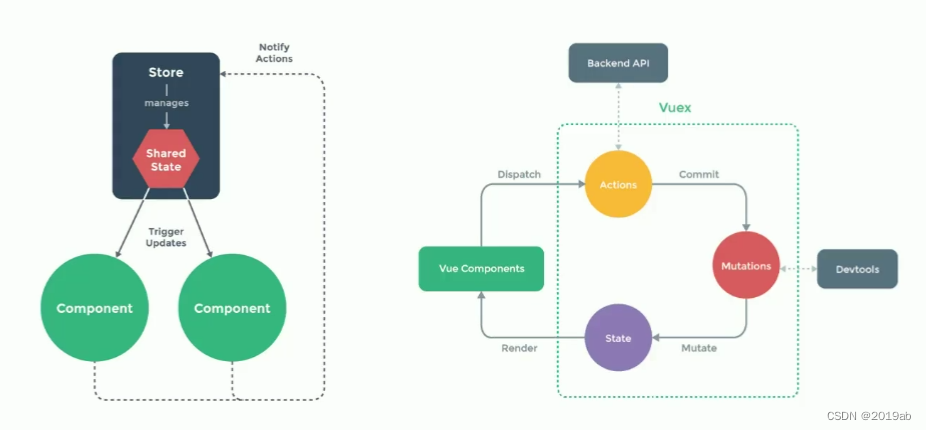Vue3中Vuex状态管理库学习笔记(一)
2019ab/CSDN发表于:2024-05-13 15:25:43浏览:154次
1.什么是状态管理
在开发中,我们会的应用程序需要处理各种各样的数据,这些数据需要保存在我们应用程序的某个位置,对于这些数据的管理我们就称之为状态管理。
在之前我们如何管理自己的状态呢?
- 在Vue开发中,我们使用组件化的开发方式;
- 在组件中我们定义data或者在setup中返回使用的数据,这些数据我们称之为state;
- 在模块template中我们可以使用这些数据,模块最终会被渲染成DOM,我们称之为View;
- 在模块中我们会产生一些行为事件,处理这些行为事件时,有可能会修改state,这些行为我们称之为actions;
2.Vuex的状态管理
管理不断变化的state本身也是非常困难的:
- 状态之间相互会存在依赖,一个状态的变化会引起另一个状态的变化,View页面也有可能引起状态的变化;
- 当应用程序复杂时,state在什么时候,因为什么原因发生了变化,发生了怎么样的变化,会变得非常难以控制和追踪;
因此,我们是否可以考虑将组件的内部状态抽离出来,以一个全局单例的方式来管理呢? - 在这种模式下,我们的组件树构成了一个巨大的 “试图View”;
- 不管在树的那个位置,任何组件都能获取状态或者触发行为;
- 通过定义和隔离状态管理中的各个概念,并通过强制性的规则来维护视图和状态间的独立性,我们的代码便会变得更加结构化和易于维护,跟踪;
这就是Vuex背后的基本思想,它借鉴了Flux,Redux,Elm(纯函数语言,redux有借鉴它的思想);
当然,目前Vue官网也在推荐使用Pinia进行状态管理,我后续也会进行学习。
3.Vuex的状态管理
4.Vuex的安装
npm install vuex
5.Vuex的使用
在src目录下新建store目录,store目录下新建index.js,内容如下
import { createStore } from "vuex";
const store = createStore({
state:() => ({
counter:100
})
})
export default store
在main.js中引用
import { createApp } from 'vue'
import App from './App.vue'
import store from './store'
createApp(App).use(store).mount('#app')
App.vue中使用
<template>
<div class="app">
<h2>App当前计数:{{ $store.state.counter }}</h2>
<HomeCom></HomeCom>
</div>
</template>
<script setup>
import HomeCom from './views/HomeCom.vue'
</script>
<style>
</style>
6.创建Store
每一个Vuex应用的核心就是store(仓库):
- store本质上是一个容器,它包含着你的应用中大部分的状态(state);
Vuex和单纯的全局对象有什么区别呢?
- Vuex的状态存储是响应式的
- 当Vue组件从store中读取状态的时候,若store中的状态发生变化,那么相应的组件也会被更新;
- 你不能直接改变store中的状态
- 改变store中的状态的唯一途径就是显示提交(commit)mutation;
- 这样使得我们可以方便的跟踪每一个状态的变化,从而让我们能够通过一些工具帮助我们更好的管理应用的状态;
使用步骤:
- 创建Store对象;
- 在app中通过插件安装;
HomeCom.vue
<template>
<div>
<h2>Home当前计数:{{ $store.state.counter }}</h2>
<button @click="increment">+1</button>
</div>
</template>
<script setup>
import { useStore } from 'vuex';
const store = useStore()
function increment(){
// store.state.counter++
store.commit("increment")
}
</script>
<style scoped>
</style>
store/index.js
import { createStore } from "vuex";
const store = createStore({
state:() => ({
counter:100
}),
mutations:{
increment(state){
state.counter++
}
}
})
export default store
7.在computed中使用Vuex
options-api
<h2>Computed当前计数:{{ storeCounter }}</h2>
<script>
export default{
computed:{
storeCounter(){
return this.$store.state.counter
}
}
}
</script>
Componsition-API
<h2>Componsition-API中Computed当前计数:{{ counter }}</h2>
const store = useStore()
// const setupCounter = store.state.counter; // 不是响应式
const { counter } = toRefs(store.state);
8.mapState函数
options-api中使用
<!-- 普通使用 -->
<div>name:{{ $store.state.name }}</div>
<div>level:{{ $store.state.level }}</div>
<!-- mapState数组方式 -->
<div>name:{{ name }}</div>
<div>level:{{ level }}</div>
<!-- mapState对象方式 -->
<div>name:{{ sName }}</div>
<div>level:{{ sLevel }}</div>
<script>
import { mapState } from 'vuex';
export default {
computed:{
fullname(){
return 'xxx'
},
...mapState(["name","level"]),
...mapState({
sName:state => state.name,
sLevel:state => state.level
})
}
}
</script>
Componsition-API
<!-- Setup中 mapState对象方式 -->
<!-- <div>name:{{ cName }}</div>
<div>level:{{ cLevel }}</div> -->
<!-- Setup中 使用useState -->
<div>name:{{ name }}</div>
<div>level:{{ level }}</div>
<button @click="incrementLevel">修改level</button>
<script setup>
// import { computed } from 'vue';
// import { mapState,useStore } from 'vuex';
import { useStore } from 'vuex';
// import useState from '../hooks/useState'
import { toRefs } from 'vue';
// 1.一步步完成
// const { name,level } = mapState(["name","level"])
// const store = useStore()
// const cName = computed(name.bind({ $store:store }))
// const cLevel = computed(level.bind({ $store:store }))
// 2. 使用useState
// const { name,level } = useState(["name","level"])
// 3.直接对store.state进行结构(推荐)
const store = useStore()
const { name,level } = toRefs(store.state)
function incrementLevel(){
store.state.level++
}
</script>
hooks/useState.js
import { computed } from "vue";
import { useStore,mapState } from "vuex";
export default function useState(mapper){
const store = useStore()
const stateFnsObj = mapState(mapper)
const newState = {}
Object.keys(stateFnsObj).forEach(key=>{
newState[key] = computed(stateFnsObj[key].bind({$store:store}))
})
return newState
}
9.getters的基本使用
某些属性可能需要经过变化后来使用,这个时候可以使用getters:
import { createStore } from "vuex";
const store = createStore({
state:() => ({
counter:100,
name:'why',
level:10,
users:[
{id:111,name:'why',age:20},
{id:112,name:'kobe',age:30},
{id:113,name:'james',age:25},
]
}),
mutations:{
increment(state){
state.counter++
}
},
getters:{
doubleCounter(state){
return state.counter * 2
},
totalAge(state){
return state.users.reduce((preValue,item)=>{
return preValue + item.age
},0)
},
message(state){
return `name:${state.name} level:${state.level}`
}
}
})
export default store
获取
<template>
<div>
<button @click="incrementLevel">修改level</button>
<h2>doubleCounter:{{ $store.getters.doubleCounter }}</h2>
<h2>usertotalAge:{{ $store.getters.totalAge }}</h2>
<h2>message:{{ $store.getters.message }}</h2>
</div>
</template>
<script>
export default {
}
</script>
<script setup>
</script>
<style scoped>
</style>
注意,getter是可以返回函数的
// 获取某一个frends,是可以返回函数的
getFriendById(state){
return (id) => {
const friend = state.friends.find(item=>item.id == id)
return friend;
}
}
使用
<h2>friend-111:{{ $store.getters.getFriendById(111) }}</h2>
mapGetters的辅助函数
我们可以使用mapGetters的辅助函数
options api用法
<script>
import { mapGetters } from 'vuex';
export default {
computed:{
// 数组语法
// ...mapGetters(["doubleCounter","totalAge","message"]),
// 对象语法
...mapGetters({
doubleCounter:"doubleCounter",
totalAge:"totalAge",
message:"message"}),
...mapGetters(["getFriendById"])
}
}
</script>
Composition-API中使用mapGetters
<script setup>
import { toRefs } from 'vue';
// computed
import { useStore } from 'vuex';
// mapGetters
const store = useStore();
// 方式一
// const { message:messageFn } = mapGetters(["message"])
// const message = computed(messageFn.bind({ $store:store }))
// 方式二
const { message } = toRefs(store.getters)
function changeAge(){
store.state.name = "coder why"
}
// 3.针对某一个getters属性使用computed
const message = computed(()=> store.getters.message)
function changeAge(){
store.state.name = "coder why"
}
</script>
10. Mutation基本使用
更改Vuex的store中的状态的唯一方法是提交mutation:
mutations:{
increment(state){
state.counter++
},
decrement(state){
state.counter--
}
}
使用示例
store/index.js
import { createStore } from "vuex";
const store = createStore({
state:() => ({
counter:100,
name:'why',
level:10,
users:[
{id:111,name:'why',age:20},
{id:112,name:'kobe',age:30},
{id:113,name:'james',age:25},
],
friends:[
{id:111,name:'why',age:20},
{id:112,name:'kobe',age:30},
{id:113,name:'james',age:25},
]
}),
getters:{
doubleCounter(state){
return state.counter * 2
},
totalAge(state){
return state.users.reduce((preValue,item)=>{
return preValue + item.age
},0)
},
message(state){
return `name:${state.name} level:${state.level}`
},
// 获取某一个frends,是可以返回函数的
getFriendById(state){
return (id) => {
const friend = state.friends.find(item=>item.id == id)
return friend;
}
}
},
mutations: {
increment(state){
state.counter++
},
changeName(state){
state.name = "王小波"
},
changeLevel(state){
state.level++
},
changeInfo(state,userInfo){
state.name = userInfo.name;
state.level = userInfo.level
}
},
})
export default store
<template>
<div>
<button @click="changeName">修改name</button>
<h2>Store Name:{{ $store.state.name }}</h2>
<button @click="changeLevel">修改level</button>
<h2>Store Level:{{ $store.state.level }}</h2>
<button @click="changeInfo">修改level和name</button>
</div>
</template>
<script>
export default {
methods:{
changeName(){
console.log("changeName")
// // 不符合规范
// this.$store.state.name = "李银河"
this.$store.commit("changeName")
},
changeLevel(){
this.$store.commit("changeLevel")
},
changeInfo(){
this.$store.commit("changeInfo",{name:'张三',level:'100'});
}
}
}
</script>
<style scoped>
</style>
Mutation常量类型
1.定义常量 store/mutation-type.js
export const CHANGE_INFO = "CHANGE_INFO"
2.定义mutation
引入 store/index.js
import { CHANGE_INFO } from "./mutation_types";
[CHANGE_INFO](state,userInfo){
state.name = userInfo.name;
state.level = userInfo.level
}
3.提交mutation
引入 HomeCom.vue
import {CHANGE_INFO } from "@/store/mutation_types"
changeInfo(){
this.$store.commit(CHANGE_INFO,{name:'张三',level:'100'});
}
感谢观看,我们下次见


